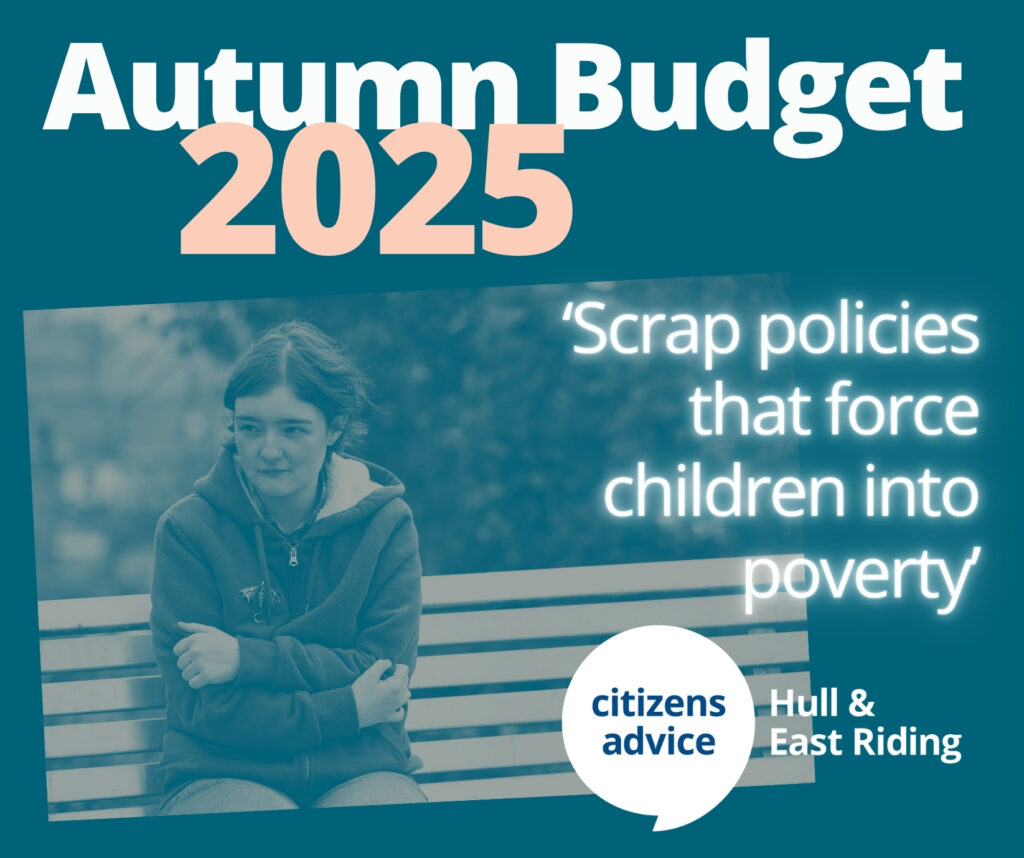Autumn Budget 2025: Why scrapping the two-child limit and benefit cap must be a priority
In the run-up to the Autumn Budget (November 26th), Citizens Advice has three key asks for the Chancellor – vital changes that would help prevent hardship and support the most vulnerable people in our communities. Each week, we are sharing a blog that explains one of these asks and why it matters for the people we see every day across Hull & East Riding. This week, we are focusing on children and families – because no child should grow up in poverty simply due to the design of the benefits system.
Our final budget request is to scrap the two-child limit and the benefit cap.

These policies work together to limit the support families receive, often leaving children without the essentials they need to stay safe, healthy, and able to thrive.
What is the two-child limit?
The two-child limit was introduced in 2017. It means:
Most families with children born during or after April 2017 can only receive Universal Credit support for up to two children, no matter their circumstances. There are some exceptions, but this is a limited list.
This ignores the reality of family life. Families can grow through unplanned pregnancy, kinship care arrangements, changes in relationships, cultural reasons, or simply because people plan their families before their financial situation changes.
Children do not choose the circumstances they are born into – but the policy means some children are treated as less deserving of support than their siblings.
What is the benefit cap?
The benefit cap sets a maximum limit on the total amount of benefits a household can receive, regardless of their rent, family size, or needs.
It particularly affects:
- Larger families
- Single parents with young children
- Households in areas with higher housing costs
Even if a family qualifies for more support, they never receive it because the cap cuts off their entitlement.
Why scrapping both policies matters
Lifting the two-child limit alone is not enough.
Families would still be blocked from receiving the support they need because of the benefit cap.
To prevent child poverty from worsening, both must be scrapped together.
The real impact on local families
The people we support every day are living with the consequences:
- One parent we helped has four children and is subject to both policies. Because of the two-child limit, they receive nothing for their youngest two children – and the benefit cap restricts support even further, pushing the family into deep financial hardship.
- Another client has three children and is affected by the two-child limit. They are already relying on foodbanks and charity support to feed their children. Receiving the child element for their youngest would lift them out of crisis.
- A third client has a negative monthly budget and is struggling to pay for energy. Even if the two-child limit were removed, they would still be hit by the benefit cap. Removing both would transform the situation for their family.
These are not isolated stories. They reflect a growing picture across our community – where children are going without the basics they need simply because of policy choices.
The difference these changes would make
Scrapping the two-child limit and benefit cap would lift thousands of children out of poverty, and ensure that families can afford food, heating, and essentials. This change would improve health and wellbeing outcomes, reduce reliance on foodbanks and crisis support, and would give children a fairer opportunity.
Investing in children is not just moral – it is smart. Reducing child poverty now means lower public spending on crisis services in the future.
